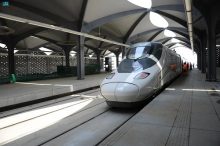 The Haramain High-Speed Railway (HHR) is one of the top 10 fastest electric-rail trains worldwide, running at 300 Km/h and playing a key role in the development and expansion of Saudi Arabia’s railway network. The HHR links the two holy cities of Makkah and Madinah, to meet the growing demand of domestic and foreign pilgrims, and helps relieve congestion on the roads between Makkah, Madinah and Jeddah. In 2018, the HHR was inaugurated under the aegis of Custodian of the Two Holy Mosques King Salman bin Abdulaziz Al Saud as the largest train project in the Middle East. On a 449-km-long track and a 3.75-km sub-track to King Abdulaziz International Airport, the train is a safe means of transportation for Hajj and Umrah performers, and for travelers to the two holy cities and Jeddah. The HHR covers the distance between Makkah and Madinah in a record time of two hours and twenty minutes, making it one of the world’s six fastest trains.
The Haramain High-Speed Railway (HHR) is one of the top 10 fastest electric-rail trains worldwide, running at 300 Km/h and playing a key role in the development and expansion of Saudi Arabia’s railway network. The HHR links the two holy cities of Makkah and Madinah, to meet the growing demand of domestic and foreign pilgrims, and helps relieve congestion on the roads between Makkah, Madinah and Jeddah. In 2018, the HHR was inaugurated under the aegis of Custodian of the Two Holy Mosques King Salman bin Abdulaziz Al Saud as the largest train project in the Middle East. On a 449-km-long track and a 3.75-km sub-track to King Abdulaziz International Airport, the train is a safe means of transportation for Hajj and Umrah performers, and for travelers to the two holy cities and Jeddah. The HHR covers the distance between Makkah and Madinah in a record time of two hours and twenty minutes, making it one of the world’s six fastest trains.
The HHR has five stations; three are terminal stations — Makkah Railway Station in Ar Rusayfah District, Madinah Railway Station, and King Abdulaziz International Airport station in Jeddah. The two others are intermediate stations: Jeddah Railway station in Al-Sulimaniyah District and King Abdullah Economic City (KAEC) station.
HHR’s King Abdulaziz International Airport station is the world’s largest train station at an airport, covering over 105,000 square meters across multiple floors and connected to six platforms for easy movement. The station helps reduce traffic congestion on the roads leading to King Abdulaziz International Airport by providing direct transportation to the other stations without the need for exiting the airport to use other means of transportation. The HHR operates 35 electric trains, each with a capacity of 417 passengers. Each train offers 113 Business Class seats and 304 Economy Class seats, and has a cafeteria among the 13 carriages. To meet the expected high demand for the HHR during the upcoming Hajj season, over 3,400 train trips will be operated between Dhul-Qaedah 1 and Dhul-Hijjah 17, providing a capacity of more than 1.5 million seats.
 Tourism Breaking News
Tourism Breaking News


